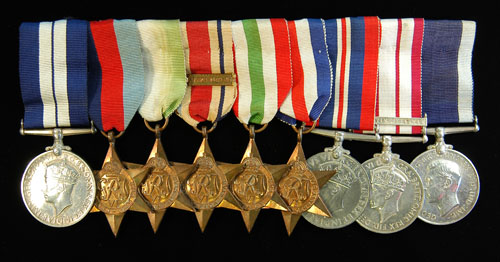
Auction: 6007 - Orders, Decorations, Campaign Medals & Militaria
Lot: 428
A Second War ´Gibraltar Convoy Escort´ D.S.M., For Actions Against U-boats, Group of Nine to Chief Yeoman of Signals A.H. McEwen, Royal Navy Distinguished Service Medal G.VI.R. (JX.130654 A.H. McEwen. Y.S.); 1939-45 Star; Atlantic Star; Africa Star, with North Africa 1942-43 Bar; Italy Star; France and Germany Star; Defence Medal; Naval General Service 1915-62, G.VI.R., one clasp, Palestine 1945-48 (D/JX,130654 A.H. McEwen. D.S.M. C.Y.S. R.N.); Royal Naval Long Service & G.C., G.VI.R., 1st ´Ind: Imp:´ type (JX130654 A.H. McEwen. Y.S. H.M.S. Hesperus.), nearly extremely fine, mounted as originally worn, with portrait photograph, original Certificate of Service and newspaper cutting (9) Estimate £ 800-1,000D.S.M. London Gazette 24.3.1942 Yeoman of Signals Alexander Henry McEwen, D/JX.130654 ´For skill and enterprise in action against Enemy Submarines while serving in H.M. Ships Exmoor, Blankney, Stanley, Mallow, and Marigold.´ Convoy H.G. 76 On the 14th December 1941 Convoy H.G. 76 set sail from Gibraltar homeward bound, under the command of Commander F.J. Walker. The convoy, comprising of 32 ships, was provided with an escort of: two sloops; three destroyers (one of which being H.M.S. Stanley, the ship which McEwen was aboard); seven corvettes and the aircraft carrier H.M.S. Audacity. The convoy merited a strong escort given the concentration of U-boats strategically placed off the Straits of Gibraltar. Within hours of departing the convoy came across two U-boats attempting the passage of the Straits. With their ultimate objective elswhere the enemy vessels where seen off after a brief skirmish, with the Australian destroyer Nestor sinking U.127 off Cape St. Vincent (15th December). The next day a Focke-Wulf reported sighting the convoy, and a force of nine U-boats were despatched to intercept. From the 17th-21st December the battle raged day-and-night between the escort and the enemy force, with both sides inflicting heavy casualties. U.131 was sunk on the first day by a combination of the surface escort and the Audacity´s Martlets, and the same fate was shared by U.434 during the next day. H.M.S. Stanley, which had contributed so much to the previous two days action, was herself torpedoed and sunk on the 19th. Walker took the tally up to four, also on the 19th, by sinking U. 567 from his sloop H.M.S. Stork. His vessel was later damaged trying to ram U. 574. The final British casualty during the battle was the Audacity, who fell victim to a U-boat five hundred miles west of Finisterre, on the 21st December. The German attack was called off on the 23rd; the convoy had come within range of air protection from the home bases and the enemies loses had been considered high enough. Five U-boats had been sunk, whilst only two merchant ships had been lost. (The War at Sea, Volume I, S.W. Roskill refers) Chief Yeoman of Signals Alexander Henry McEwen, D.S.M., born 1912 in Shoreditch, London; joined as Boy Royal Navy, 1927; Leading Signaller 1938; Yeoman of Signals 1941; served in H.M.S. Stanley 26.7.1941-19.12.1941; Chief Yeoman of Signals 1945; served the latter part of the war in H.M.S. Hesperus, including when she sank U.325, north of Anglesey (30.4.1945), and U.326 in St. Georges Channel (7.5.1945).
Sold for
£3,600




